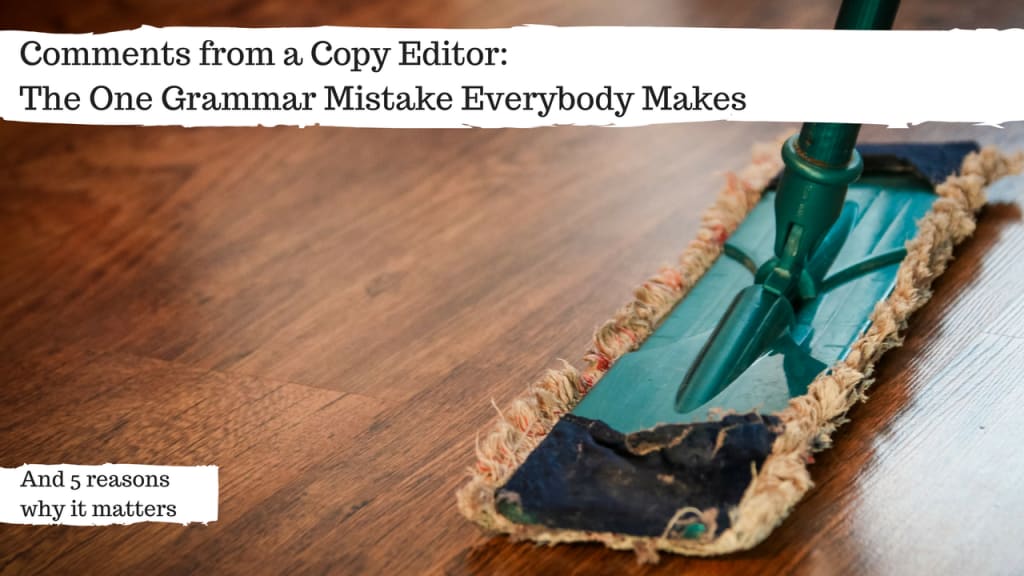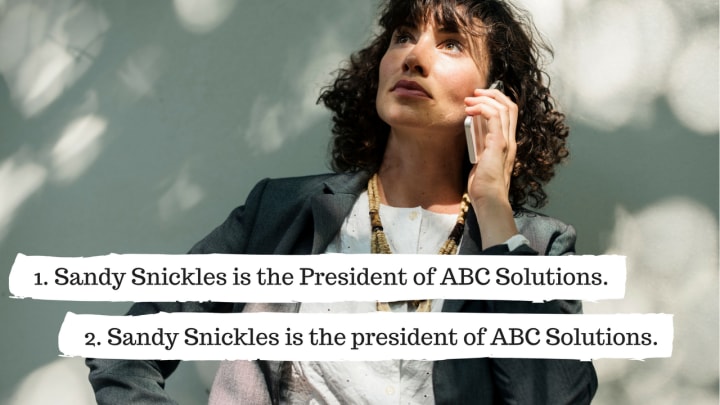Comments from a Copy Editor: The One Grammar Mistake Everybody Makes
And five reasons why it matters.

Which one is correct?

What I can glean from years of copy editing is that most English-speaking humans believe words get capitalized because they are important. My name, which is “Mike,” is obviously important to me, and thus gets a capital letter. Following that rationale, you would be tempted to pick number one in the above picture as the correct grammar, but it’s not. That’s because “president” is referring to Sandy’s job description. The word “president” would only be capitalized if it was referencing her job title, as it does in this sentence:

The key to understanding the difference between the two is understanding how common nouns and proper nouns differ from each other. Indeed, proper nouns are things like names and places. But, underneath that, what they’re actually communicating is that the capitalized word refers to something specific: a one-of-a-kind thing, i.e., Sandy Snickles’ specific job title.
But the issue of when to capitalize words, especially job titles, is blurry for most. Just open up 75% of job ads and you’ll see sentences similar to this one: “We are currently looking for a freelance Communications Associate for ongoing copy editing responsibilities.” This is grammatically incorrect because “Communications Associate” is a job description, not a title, and therefore a common noun. It could potentially become your job title if you get the job, but in the context of a job ad it's a description of the position. In replying to the ad, however, would you point out the job poster’s error by putting the job description in all lower case letters? I certainly wouldn’t.
The difference between “president” and “President” might seem inconsequential. Does it really matter all that much? Of course it does, and I have five good reasons why.
Five Reasons Why Incorrect Capitalization Matters 1. There’s a possibility for confusion.
Take the difference between “west coast” and “West Coast,” for example. If someone sent you a text that read, “Meet me on the west coast,” you would be grammatically wise to confirm which west coast they mean before hopping on a plane to Vancouver. That is, do they mean the West Coast, as in the specific narrow strip of land along the western side of the continent (Vancouver, Seattle, Portland, etc.)? Or, do they mean the west coast of any old sea or ocean? The potential for confusion becomes more pronounced in the difference between “western” and “Western,” the former referring to “situated in the west,” the latter referring to something entirely different, i.e., Western society, culture, traditions, etc.
But let’s be real, shall we. The possibility for confusion in everyday speak is relatively minor. There are definitely times when it could matter, like in legal contracts. Words like “Party” or “Client” can be used as placeholders for the full name of that specific party or client. Specific departments within organizations, which are named after their processes, should be differentiated from those processes, as follows:
The success of the ABC Solutions is supported by the effective communications produced by the Communications department.
But what it boils down to for me is the responsibility of the writer to be clear. These are my words and I am ultimately responsible for clarity of communication to my reader.
2. It looks messy.
It does. One or two incorrect capitalizations won’t matter much, but if a bit of writing is littered with them, it starts to look messy. Good, clean writing is like a perfectly made bed with the corners tucked in, the blankets smoothed out and the pillows fluffed up.
The success of ABC Solutions is supported by the Effective Communications produced by The Communications Department.
What a mess.
3. There are better options to emphasize importance.
Want to emphasize the importance of a word? Instead of capitalizing it incorrectly, try bolding it or using italics. Typically, italics are meant to be used when foreign words show up in English writing, like "vs." But, unless you’re writing academic papers, I say use the italics how you want.
The success of ABC Solutions is supported by the effective communications produced by the Communications department.
Gorgeous.
4. It reveals a certain classism.
It might feel incorrect, in a kind of disrespectful way, to not capitalize the word “president” in sentences like this one:
Sandy Snickles is the president of ABC Solutions.
But if capitalizing job descriptions is the rationale we’re following, would the same impulse suggest a capital letter in this sentence?

Why doesn’t Mark McMickle the janitor get a capital letter? Hasn’t he earned it? Doesn’t he work hard? While Mark the janitor works hard and deserves recognition, unfortunately he has not earned a capital letter. But then neither has Sandy the president. That’s because capital letters are not earned things, and capitalizing "president" but not "janitor" speaks to a subtle, underlying, grammatical classism.
Don’t worry: I’m not saying you’re classist anymore than the next guy or gal, or myself even. These are simply habits programmed into each of us by a hierarchical society and its language. If you reject classism, like I do, then why not use grammar to stick it to them?
The pen is mightier than the sword, after all.
5. Someone will notice.
They will. How do I know this? Because I exist. 99.9 percent of people might not notice, but there is someone out there who will – and that person could very well be a key decision-maker, so why take the chance that messy grammar might rub ‘em the wrong way? From that context, the question changes from, “Why bother fussing over the grammar?” to “Why not bother fussing over the grammar?”
There is also a practical component to copy editing itself in leveraging grammar conventions to guide the edits you do make. Rather then hum or haw over which rules to follow, instead just follow them. It will give your editing and the finished products consistency, if nothing else.
That said, I also strive to be chill about things. If the writer I’m editing for insists on capitalizing something, or some other equally icky grammar faux pas, all I can do is provide my recommendation and let them decide what’s right for their bit of writing.
About the Creator
Mike Dineen
Quiet person making some noise.
thestrongsilenthype.com
Enjoyed the story? Support the Creator.
Subscribe for free to receive all their stories in your feed. You could also pledge your support or give them a one-off tip, letting them know you appreciate their work.






Comments (1)
Language is always diverse and rich. Every word has its usage. For words, it is usually capitalized to make it easier to recognize and to indicate proper nouns https://snake-io.io